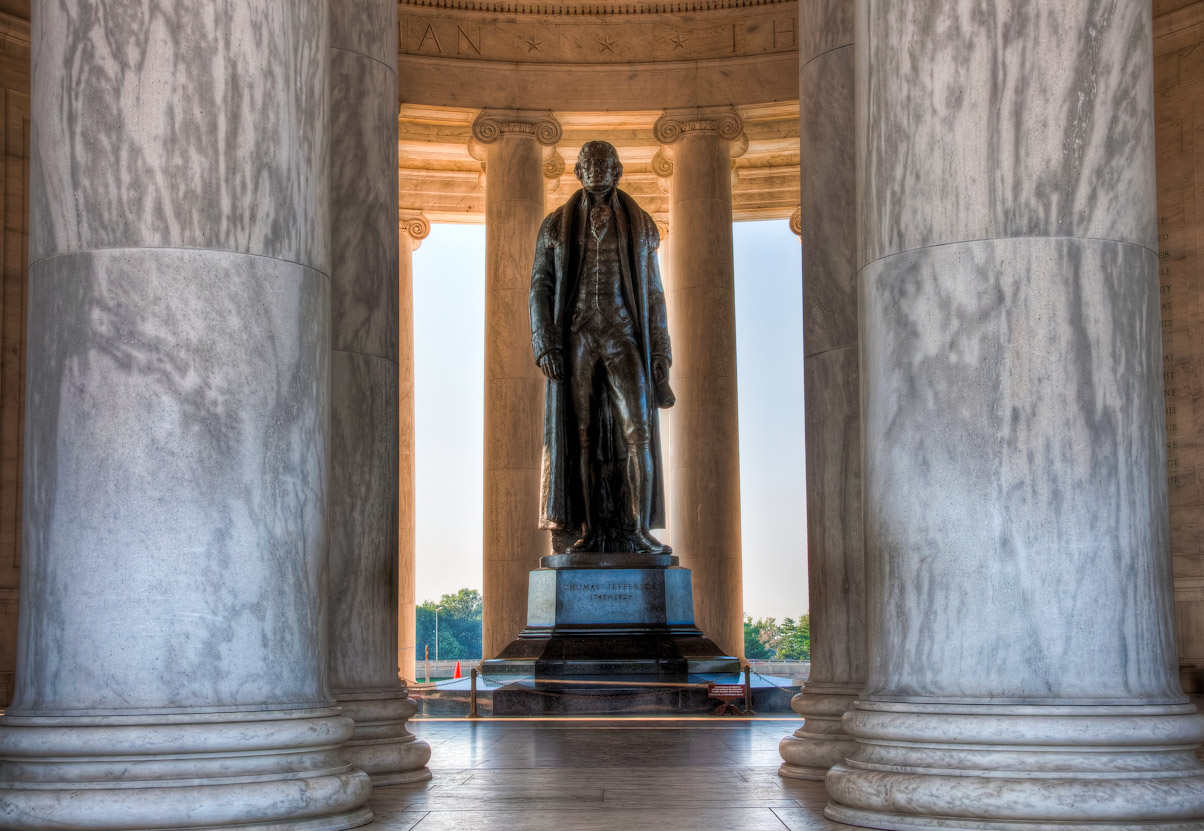Is the United States of America still an “Empire for Liberty” or have we become an Empire for something else entirely?
by Joey Clark
[dropcap size=small]I[/dropcap] strolled down the heart of the Imperial City a bit dried and crusty from the previous night’s revelry with the Tidal Basin to my right and the Jefferson Memorial inflating in size the closer I come to approaching the temple’s first steps. Upon entering the threshold, massive marble columns flexing on every side of me, my mind is struck by two things: first, the towering bronze statue of Jefferson solemnly overlooking the Capitol of what he hoped would be an “Empire for Liberty” and second, the words of Vidal’s Burr regarding old Tom, “He was the most charming man I have ever known as well as the most deceitful.”
Men like to pretend that when they were children, they thought like children and talked like children and reasoned like children, but now as MEN, they have put aside their ways of childhood. But most are still children, whiskered and whiskey soaked, a reflection of their younger selves cast anew in the gilding of their years on earth.
Their masks become more chiseled, more hardened, more weathered, sometimes even commemorated in bronze, but concealed are still the same little cherub-faced boys or girls, fearful and envious, yet still strangely sentimental as they long for the best life has to offer.
Politics is first found at the home, then the schoolyard mud and tussle, then the bedroom romp and rustle, then the boardroom hustle and bustle, until it finds a seat in gaudy temples of power and pretends its past will be its selfish salvation in the future minds of others.
“Good to know how far charm and deceit will take you!” I think to myself, looking back up at the statue, “Well, Mr. Jefferson, it appears we have an Empire, but one for liberty? I cannot tell you this if the truth is what you wish to hear.”
No, the American Empire today brings us despotism–soft at home and hard abroad. Power has been greatly centralized in this district on the Potomac. The American “democracy” once hailed by Alexis de Tocqueville–local, voluntary, and hopeful–has become warped by its lusts just as Tocqueville foresaw. As I was flying into D.C. earlier in the day, looking down at the sprawling set of government buildings below, a portion of Alexis’ prophetic warning came to my mind:
Above this race of men stands an immense and tutelary power, which takes upon itself alone to secure their gratifications and to watch over their fate. That power is absolute, minute, regular, provident, and mild. It would be like the authority of a parent if, like that authority, its object was to prepare men for manhood; but it seeks, on the contrary, to keep them in perpetual childhood: it is well content that the people should rejoice, provided they think of nothing but rejoicing. For their happiness such a government willingly labors, but it chooses to be the sole agent and the only arbiter of that happiness; it provides for their security, foresees and supplies their necessities, facilitates their pleasures, manages their principal concerns, directs their industry, regulates the descent of property, and subdivides their inheritances: what remains, but to spare them all the care of thinking and all the trouble of living.
Though the despotism here in the “Homeland” may be soft for the moment, just the very word “Homeland” signals its hardening. The hard power of American Empire abroad is being brought back home, and as I find myself back home in Montgomery, AL, I sit in front of the television watching many of the people who would expedite this process in the fifth GOP Presidential debate for the 2016 elections.
Billed as a “national defense” debate given the recent terrorist attacks in Paris and San Bernardino, the event should really be called “a debate on the maintenance of the American Empire.” Rather than soberly connecting the geo-political events of today, the debate is mostly about who can score the most points and show the most “strength” with “strength” signified by who is most willing to dispense with the last of our liberties for the sake of “security.” How fitting that the debate is being held on “Bill of Rights Day.”
Writing in the early 1890’s at the pinnacle of the British Empire, Oscar Wilde quipped, “A man who can dominate a London dinner-table can dominate the world,” and for a short time Wilde was correct in his estimation. But after the multi-decade European Civil War which saw the suicide of Christendom and the dismantling of British Imperium, the mantle of Empire was to be carried by America, a nation who many are credited with describing satirically as “the only country that went from barbarism to decadence without knowing civilization.”
Thus, more than a century after Wilde’s “dinner-table” remark, I think it now safe to say: he who dominates the American imagination through television can dominate the world.
And how does one dominate the American imagination? By appealing to Americans’ barbarism and decadence with imperial bluster: barbaric fear, hatred and envy grasped in the one hand with decadent pride, lust, and avarice clutched in the other. A decade after the September 11, 2001 terror attacks, Anthony Gregory reminded us of Garett Garrett’s assessment of the American Imperium’s character:
Garet Garrett referred to America’s paradoxical “complex of fear and vaunting” — the U.S. empire’s tendency to pump itself up as the greatest nation in the history of the world, dwarfing the mere mortal nations that dot the globe, only to shrink back into a state of hysteria, worried hopelessly that someone, somewhere, will destroy the country if not every precaution is taken. Both orientations, the hubris and the paranoia, make for a belligerent foreign policy and an unfree people, and Garrett’s insight rings even truer today. Americans are so quick to pat themselves on the back for defeating the Taliban, or Saddam, or Gaddafi, or hearing that bin Laden was shot in the head as he stood unarmed. Yet we will take our shoes off at the airport and walk through an invasive pat-down procedure out of concern that the grandma at the next line over is really a terrorist.
When it comes to our leaders inspiring the people, such a “complex of fear and vaunting” or mix of barbarism and decadence undermines any genuine defense of American civilization–that is, America’s tradition of presuming individual liberty. Even those (such as Senator Marco Rubio) who speak of a “civilizational clash” between the West and Islamo-fascists, rarely intend to actually defend the American tradition of liberty.
I say this because Rubio and his ilk are so swift say we must sacrifice our liberty for safety, sacrifice our liberty for the sake of executing the “clash” between former Christendom and the aspiring Caliphate as well as any future clash with the Russians, the Chinese, or any other people who may potentially challenge the “indispensable nation.”
One may suggest the “Empire for Liberty” has now become the “Empire for Safety, Stability, and Global Order,” and my mind can only go back to Jefferson’s bronze face as I wonder, “is it too late to restore a libertarian republic? Or, was it the republic who led us here in the first place?”
A chilling thought, I know. But it is what I thought nonetheless. Say what you will about the American Empire: though it may often be violent and deceitful, it certainly is charming and entertaining.
Just as Mr. Burr thought of Mr. Jefferson.




1 comment
… [Trackback]
[…] Find More on that Topic: thelibertarianrepublic.com/what-happened-to-the-empire-for-liberty/ […]